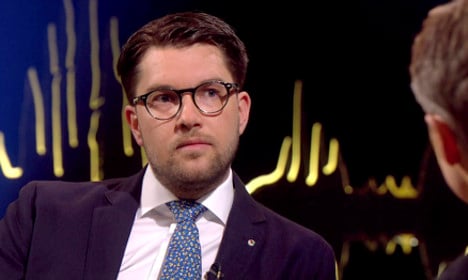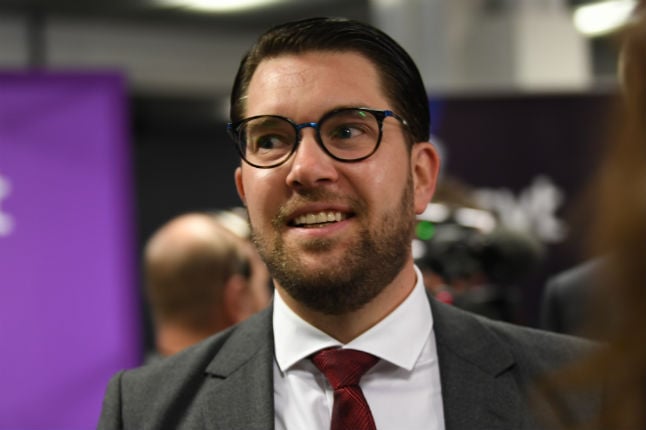In Sweden, complaints started even before the interview aired with many criticising public broadcaster SVT on social media for giving the controversial far-right leader a forum on Norwegian journalist Fredrik Skavlan’s popular show.
Popular stand-up comedian Jonas Gardell tweeted, "Hold on: so the kids and I are expected to sit in front of the TV with soft drinks, crisps and Jimmie Åkesson? What kind of bloody cosy Friday is that???"
But once the programme had been broadcast, most viewers focussed on how the interview was conducted, arguing that Åkesson had been treated too harshly by Skavlan.
He repeatedly asked Åkesson about controversial, and often racist, statements made in the past by Sweden Democrats. A blogger for Sweden's GP newspaper titled his entry on the interview: “Skavlan was a pitbull”.
The nationalist leader has been on sick leave since October 2014 and is still on antidepressants.
"There's obviously a reason why others don't choose to talk about this. It's because you're scared, as a political leader, to be perceived as weak. 'How are you supposed to return to your party leader job now, you who are taking antidepressants? You, who are so weak, how are you going to manage?'," Åkesson told Skavlan.
"But I think that for the sake of both the voters and myself, I have to be open about this," he added.
By Monday morning SVT said it had received more than 800 complaints, in addition to a backlash on Twitter and Facebook.
“It Is one of the largest ever numbers for a programme,” Peter Schierbeck, a spokesman for SVT told the TT news agency.
@MorKarins Lowest point of his career, #Skavlan acted like a bully.
— Eli Lian (@EliMLian) March 27, 2015
Norwegian public broadcaster NRK was also inundated with viewer protests and reports flew in fast to the Norwegian authority that oversees broadcasting content. A Facebook group “Boycott Skavlan” soon appeared.
“This is certainly among the eight to ten items or programmes that have elicited the most reactions over the past few years,” the authority’s secretary, Erik Berg-Hansen, told Norwegian tabloid Verdens Gang.
Sweden Democrat press spokesman Henrik Vinge wrote in a text message to Verdens Gang: “In Sweden we have long had a positive image of Norwegian media, but yesterday Skavlan acted just like a Swedish journalist.”
SVT defended its approach, arguing that it had a role to “comment on and question the world”.
“This premise applies to Åkesson just like everyone else,” press spokeswoman Sabina Rasiwala told TT.
Other viewers praised the broadcaster for this approach, arguing that Jimmie Åkesson needed to be grilled for his far-right views.
If a party continues to express themselves with racist remarks, then it's our responsibility to continue to question that. #skavlan
— Josefine Thorén (@JosefineThoren) March 27, 2015
The Sweden Democrats are the third largest political group in Sweden, scoring a record 12.9 percent of the vote in September's election. During Åkesson's six-month absence, Mattias Karlsson has been the party's acting leader and some had suggested that he could take over the helm of the party permanently.
Åkesson says he will return to work in successive stages from March 31st.



 Please whitelist us to continue reading.
Please whitelist us to continue reading.